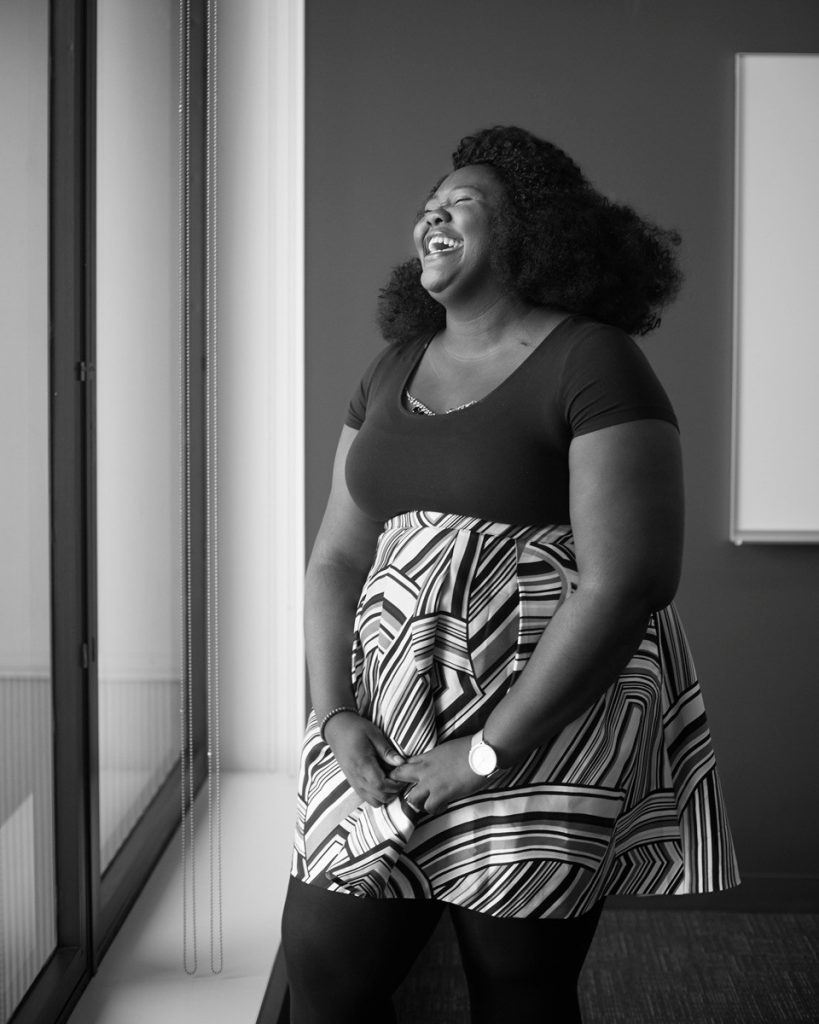
Kalé Kponee, SD ’19, is completing a joint doctoral degree program in environmental health sciences and epidemiology at the Harvard T.H. Chan School of Public Health. Her recent research has centered on the adverse health effects of crude oil contamination in Nigeria’s southern territory of Ogoniland—her home— where hundreds of spills have destroyed wildlife, fisheries, and groundwater systems since oil was discovered in the region in the 1950s.
Kponee spent her early childhood in Lagos and Rivers State, before war and genocide forced her to travel at age 7—with the help of a clandestine network of family friends—alone by bus to a refugee camp in Benin, where she spent the next two years. In 2000, she and her mother were resettled in the United States, and she has since lived in Louisiana, Nebraska, and Missouri. Kponee spoke recently with Madeline Drexler, editor of Harvard Public Health.
Q: What led you from fleeing violence in Nigeria to a career in public health?
A: In the 1990s, there were a lot of gas flares and oil spillages in Ogoniland, due to unregulated excavations for oil. We had environmental health leaders—the most famous being Ken Saro-Wiwa— who protested and demanded that the government find safer and more regulated ways to drill oil but also to give back to communities. Saro-Wiwa led many peaceful protests, but eventually he and eight others were hanged for treason by the Nigerian government, under the military dictator Sani Abacha.
During that time, Ogoni people had their villages burnt down. Children were taken from their parents. Women were raped. Men were killed. When I came to the U.S., I was a very angry child. I had seen quite a lot, and I was forceful about needing to stand up for myself, stand up to people, fight against injustice everywhere.
Eventually, I found that science was my tool for social justice. Scientific research was a way to channel my life’s experiences into something meaningful, something objective, something precise, something that couldn’t be refuted. I’m interested in translational research— doing studies in such a way that the world has to stop and take notice. My mission is to rectify the historic injustices against the Ogoni people.
Q: Among other things, you’ve studied the health effects of oil contamination, endocrine disrupters, and radiation exposure. What theme unites these topics?
A: You can choose to smoke or not, right? And one can argue that even putting a doughnut in your mouth is a choice. But you can’t control the air. You can’t control the water that you drink. You can’t control the chemicals that you’re exposed to. It’s a duty of governments to give their citizens an environment that is free of harm, one that is conducive to people’s ability to not just survive but thrive.
Q: You are an immigrant and a scientist—a member of two groups who may feel under siege at the moment. Which form of discrimination affects you more?
A: It’s hard to say, because I consider myself an immigrant, a scientist, and a black woman. Those parts of my identity are inextricably linked.
Because I’m in a doctoral program, what I feel is being most threatened right now is my role as a future scientist and public health practitioner. Research is an intellectual activity, but it takes place in a political environment, and it relies on financial and institutional infrastructures that are subject to political influence. If those infrastructures are attacked or eliminated, then research becomes more difficult or impossible, as it is
in many places where environmental researchers are violently persecuted.
Secondary to that are issues related to being black, female, and an immigrant in a society where hate crimes are on the rise. Racial and gender discrimination hasn’t gone away, even in environments that we like to consider egalitarian. Being a black woman and an immigrant means navigating implicit and explicit biases on a daily basis. But science can also be a tool for changing those misperceptions.
Q: How do you negotiate the feeling of threat?
A: I think we’re in dangerous times. There are friends of mine who are Americans who are shocked, outraged, sad. But for me, coming from a country where the government was killing people just for protesting for their rights, none of this quite surprises me.
I take comfort in knowing that I have friends who share the same goals with me, who want to fight. You can’t survive alone. My whole life, people have given me chances. I understand very well that solidarity is the only way that we can find safety during chaos.
Q: Did you know that nearly 40 percent of Harvard Chan students are immigrants, and that all six of the 2016 American Nobel Prize winners in the sciences were immigrants?
A: These facts disprove the theory that immigrants are here to perpetuate terror or oppress. Most immigrants are here to further their own intellectual advancement, in the hope that they can give back to humanity.
There are so many narratives. There’s the narrative of immigrants like myself. The narrative of the Ogoni people. The Nigerian narrative. The U.S. narrative. I’m interested in changing negative narratives.
And I’m happy that I’m part of an academic community that relies on numbers and facts. As a scientist, my role is to bear witness but also to use data in a way that is full of integrity and allows me to fight for justice in a way that is irrefutable. The truth is irrefutable. There are no alternatives.







